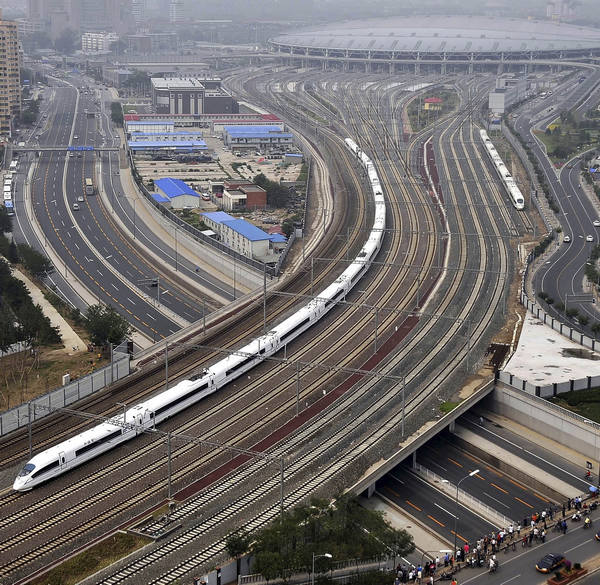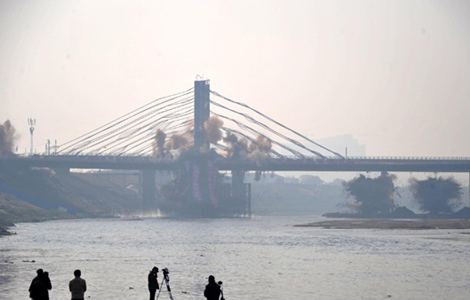Putting high-speed travel back on track
Updated: 2011-12-13 07:59
By Xin Dingding (China Daily)
|
|||||||||||
 |
|
A high-speed train begins its Beijing-Shanghai service from a station in Beijing on June 30. [Photo/Agencies] |
A turning point
In the eyes of railway experts, the dramatic events of this year have not necessarily been a bad thing.
John Scales, lead transport specialist at the World Bank's Beijing office, said the obstacles are like "a wakeup call" to the Ministry of Railways, to help it get back to the basics - quality, safe operation and stable finance.
It is an opportunity for the ministry to slow down, he said.
Following the stimulus package in 2008, China has implemented its mid- and long-term railway plans at a frenetic pace.
"If China keeps the pace of construction of the past few years, the long-term plan will be completed five years (ahead of schedule)," Scales said.
However, experts agree that slowing down the sector does not mean halting investment.
Paul Amos, a consultant to the World Bank, said China's rail network is the "least dense but heaviest used" system in the world, meaning it needs continuous investment and development.
China's passenger rail saw year-on-year growth of 11 percent from October last year to October 2011.
"(The growth) is pretty healthy, considering what happened this year. It would be a mistake to stop investing in the system," Amos said.
He suggested that work be concentrated on the main corridors of the planned high-speed network, as other projects can wait.
The reason, he explained, is that major lines are usually built to meet surging transport demands, and once in use they will generate good revenue streams to prevent the debt crisis from worsening.
Li Kun at the NDRC had a similar opinion.
"When Japan developed its high-speed railway in the 1960s, its economy was not as good as ours is now," he said. "The doubts over developing high-speed railways are a good thing, but it's still necessary for China to maintain fast development of some bullet train lines."
He brushed off worries about huge debts, however.
"Every construction project incurs debts," Li said. "The level of debt is decided by the traffic and revenue stream on a railway. When the revenue doesn't match the input, there will be a debt crisis.
"What should be done is to develop in accordance with actual demand. Development should not be blind," he added.
In the eastern areas of China, where the population is dense and economy dynamic, businesses rely heavily on road and air transport to meet logistics demands. So, Li said, development of high-speed rail in the east should "continue to be fast-tracked".
As for western areas, development could be taken step by step, he said, adding that trains should not run that fast.
However, money is still a problem. Railway projects are funded in three parts - the central government pays 40 to 50 percent, the Ministry of Railways borrows money from the banks to cover 40 percent, and provincial authorities cover 10 to 20 percent.
Once completed, the ministry uses its income, mainly from cargo transport, to cover the operation costs of both cargo and passenger rail, and slowly pay back its loans with interest.
Railway officials said that the ministry has even made a slight profit in previous years.
Yet, as construction of high-speed railways has led to huge debts, industry observers warn that the ministry may no longer be able to pay the bills, and that the old pattern is unsustainable.
Media reports quoted analysts saying that the Railways Ministry owes almost 2 trillion yuan due to high-speed rail construction. Each year, the ministry has to pay 20 billion yuan in bond interest alone, a result of the 458.7 billion yuan in bonds it issued during 1995 and November this year.
Tunnel expert Wang Mengshu said that it is time the government takes over the debt, which according to World Bank consultant Amos is common in other countries.
Observers say the central government has made some gestures, as corporate bonds issued by the ministry recently became "government-supported" bonds.
However, some experts went further and added their voices to calls for a reform of the railway sector, which has been ongoing for 20 years.
The Ministry of Railways is often referred to as "a massive monopoly", not only because it has more than 2 million full-time employees and is responsible for 91,000 km of railways (more than twice the circumference of the Earth at its equator), but it is also the only State agency that has its own independent legal system.
Zhao at Beijing Jiaotong University said previous calls for reform had failed because the ministry insisted it has this ability to gather the resources for laying high-speed tracks and increase transport capacity.
"Yet, the development pattern has been proved flawed, including not being market-oriented enough. Its debt of 2 trillion yuan has begun to affect the economy," he said. "That is the price of resisting reform."
Li at the NDRC suggested the ministry could reform its management system and list some of its assets on the stock market, so as to reduce risk.
However, Zhao said he believes the reforms should be more thorough, as it is "commonly held that the ministry should be stripped of its enterprise management role".
"The problem now is: Who will shoulder the huge debt," he said. "If a newly established railway company picks up the debt, it will go broke straightaway. It looks like there is no other choice but to let the government shoulder the debt, which might affect the economy.
"This makes reforming the railway sector a hard decision for the central government to make," he added.
Hot Topics
HIV/AIDS, Egypt protest, Thanksgiving, climate change, global economic recovery, home prices, high-speed railways, school bus safety, Libya situation, Weekly photos
Editor's Picks

|

|

|

|

|

|







